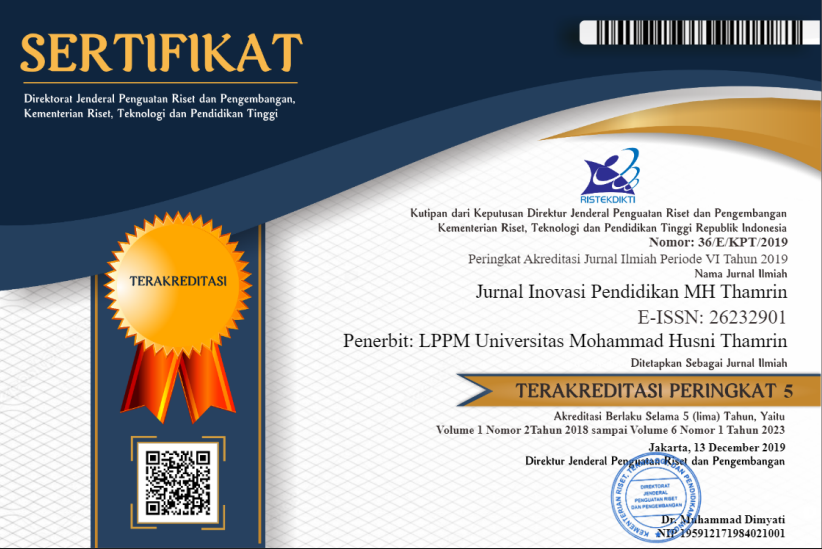Manajemen Pendidikan Pembelajaran Daring Dalam Situasi Pandemi
DOI:
https://doi.org/10.37012/jipmht.v6i2.1284Abstract
Online learning is an online or face-to-face learning system, using the internet network, with the help of media such as laptops, computers and smartphones. This Learning System is one of the learning options carried out during and after the Covid-19 pandemic. So that it becomes a concern for all of us, including student groups. One of the efforts to find out the effectiveness of online learning is by doing research. The purpose of this study is to analyze the effectiveness of implementing online learning for students. The method we use is descriptive method, namely using data collection techniques by surveying via Google form. The samples used in this study were 78 students. The results of this study indicate that online learning is quite effective, because there are still many obstacles faced so that learning is not in accordance with its achievements. The conclusion from this study is that in the future online learning must be improved with better and more varied learning media.
References
Abidinsyah, A., Ramdiah, S., & Royani, M. (2019). The implementation of local wisdom-based learning and HOTS-based assessment: Teacher survey in Banjarmasin. JPBI (Indonesian Biology Education Journal), 5(3), 407–414. https://doi.org/10.22219/jpbi.v5i3.9910
Ait, K., Rannikmäe, M., Soobard, R., Reiska, P., & Holbrook, J. (2015). Students' Self-Efficacy and Values Based on A 21st Century Vision of Scientific Literacy – A Pilot Study. Procedia - Social and Behavioral Sciences, 177(July 2014), 491–495. https://doi.org/10.1016/j.sbspro.2015.02.403
Bevan, B. (2017). The promises and the promises of Making in science education. Studies in Science Education, 53(1), 75–103. https://doi.org/10.1080/03057267.2016.1275380
Cukurova, M., & Bennett, J. (2018). Students' knowledge acquisition and ability to apply knowledge into different science contexts in two different independent learning settings.Abidinsyah, A., Ramdiah, S., & Royani, M. (2019). The implementation of local wisdom-based learning and HOTS-based assessment: Teacher survey in Banjarmasin. JPBI (Indonesian Biology Education Journal), 5(3), 407–414. https://doi.org/10.22219/jpbi.v5i3.9910
Ait, K., Rannikmäe, M., Soobard, R., Reiska, P., & Holbrook, J. (2015). Students' Self-Efficacy and Values Based on A 21st Century Vision of Scientific Literacy – A Pilot Study. Procedia - Social and Behavioral Sciences, 177(July 2014), 491–495. https://doi.org/10.1016/j.sbspro.2015.02.403
Bevan, B. (2017). The promises and the promises of Making in science education. Studies in Science Education, 53(1), 75–103. https://doi.org/10.1080/03057267.2016.1275380
Cukurova, M., & Bennett, J. (2018). Students' knowledge acquisition and ability to apply knowledge into different science contexts in two different independent learning settings. Research in Science and Technological Education, 36(1), 17–34. https://doi.org/10.1080/02635143.2017.1336709
Cutri, RM, Mena, J., & Whiting, EF (2020). Faculty readiness for online crisis teaching: transitioning to online teaching during the COVID-19 pandemic. European Journal of Teacher Education, 43(4), 523–541. https://doi.org/10.1080/02619768.2020.1815702
Ichsan, IZ, Rahmayanti, H., Purwanto, A., Sigit, DV, Irwandani, I., Ali, A., Susilo, S., Kurniawan, E., & Rahman, MM (2020). COVID-19 outbreak on environment: Profile of islamic university students in HOTS-AEP-COVID-19 and PEB-COVID-19. Tadris: Journal of Teacher Training and Tarbiyah Sciences, 5(1), 167–178. https://doi.org/10.24042/tadris.v5i1.6283
Koh, JHL, Chai, CS, Wong, B., & Hong, HY (2015). Design thinking and 21st century skills. In Design Thinking for Education: Conceptions and Applications in Teaching and Learning (pp. 1–131). https://doi.org/10.1007/978-981-287-444-3
Lile, R., & Bran, C. (2014). The Assessment of Learning Outcomes. Procedia - Social and Behavioral Sciences, 163, 125–131. https://doi.org/10.1016/j.sbspro.2014.12.297
McLean, K., Edwards, S., & Morris, H. (2017). Community playgroup social media and parental learning about young children's play. Computers and Education, 115, 201–210. https://doi.org/10.1016/j.compedu.2017.08.004
Nahdi, DS, & Jatisunda, MG (2020). Digital Literacy Analysis of Prospective Elementary Teachers in Virtual Classroom-Based Learning During the Covid-19 Pandemic. Journal of Pendas Cakrawala, 6(2), 116–123. https://doi.org/10.31949/jcp.v6i2.2133
Sepulveda-Escobar, P., & Morrison, A. (2020). Online teaching placement during the COVID-19 pandemic in Chile: challenges and opportunities. European Journal of Teacher Education, 43(4), 587–607. https://doi.org/10.1080/02619768.2020.1820981
van Laar, E., van Deursen, AJAM, van Dijk, JAGM, & de Haan, J. (2019). Determinants of 21st-century digital skills: A large-scale survey among working professionals. Computers in Human Behavior, 100, 93–104. https://doi.org/10.1016/j.chb.2019.06.017
Wargadinata, W., Maimunah, I., Dewi, Z., & Rofiq, Z. (2020). Student's Responses on Learning in the Early COVID-19 Pandemic. Tadris: Journal of Teacher Training and Tarbiyah Studies, 5(1), 141–153. https://doi.org/10.24042/tadris.v5i1.6153
Downloads
Published
How to Cite
Issue
Section
Citation Check
License
Jurnal Inovasi Pendidikan MH Thamrin allows readers to read, download, copy, distribute, print, search, or link to the full texts of its articles and allow readers to use them for any other lawful purpose. The journal allows the author(s) to hold the copyright without restrictions. Finally, the journal allows the author(s) to retain publishing rights without restrictions Authors are allowed to archive their submitted article in an open access repository Authors are allowed to archive the final published article in an open access repository with an acknowledgment of its initial publication in this journal.

Jurnal Inovasi Pendidikan MH Thamrin is licensed under a Creative Commons Attribution 4.0 International License.











